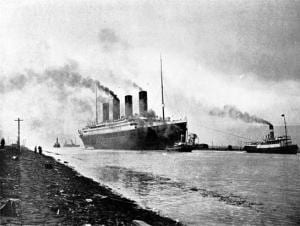 Prudence is the virtue needed in a crisis. So old stories teach us. The crisis has come and the old tales should be recollected.
Prudence is the virtue needed in a crisis. So old stories teach us. The crisis has come and the old tales should be recollected.
Each year our family has recollected the sinking of the great liner RMS Titanic. I am not sure why, only that the story moves us and encourages us to be better people. A story like that can save us if we come to understand it.
However one begins the story of the good ship, the iceberg comes. Mistakes were made. There was heroism, of course, and lessons to be learned. People behaved well, some abominably. Snobbery worked deadly evil as classism often does: so many third class lives were lost that need not have been.
In the crisis, when all decisions counted and history books were recording actions, people showed themselves. The pressure revealed character. Some unexpectedly rose to the occasion, like a not-always-noble rich man who managed to pass on saving his own life. Some like Charles Lightoller were the heroes they had been before that time and would be again. Lightoller had survived one wreck already and would, as an old man, rescue British troops at Dunkirk. Others, one thinks of Bruce Ismay, had a night they wished to forget for the rest of their days.
The grinding spread of the consequences of the pandemic and American actions to stop it are wearing even for those not sick or on the medical front lines. For those curing our sick, burying our dead, delivering our food, these are harrowing times. We are in a historic crisis. For some, training and character provide them the courage and strength they need. Captain Smith is said to have ordered his crew to “be British” and if he did, Lightoller was a living demonstration.
The rest of us, like most of the crew and passengers of the great liner, are not so blessed. We could rise to the occasion or we could panic, play the fool, or simply be a cad. We could be the functionary at the White Star Line that sent band members’ families a bill for uniforms the band did not return. A different decision easily could have been made, but thoughtless, mindless rule following posted the bill.
Let us consider our words on social media in the light of the tens of thousands who have lost loved ones unexpectedly. Perhaps we could act in solidarity, best we can in words and deeds, with the medical professionals we know. Can we think of the postal employee or the UPS guy who gets our mail and packages to us? What of the grocery clerk? If history is not watching our millions of stories, the nation is bigger than even Titanic, than our children are. Our children’s children may ask about this time as I asked my grandparents about the Depression and the War.
What did we do? Did we binge on Netflix? Drink and eat too much? Or did we pray, do our duty, work as hard as we could even when nobody was watching. Did we pray for our leaders, of both parties, and find some way to help? As millions lose their jobs, perhaps even us, do we panic as if money was ever our salvation or we keep going?
There is nothing wrong with tears, mourning when time to mourn, but next we do what we can. If we are not Charles Lightoller, then we can at least follow him, emulate his courage (even if this is unnatural to us). We can measure our words, saying less, doing more. This is our moment: a crisis has come.
What will we do?
In a crisis the great people will achieve greatness, they will be courageous and some history will recollect. Prudence is the chief virtue for the rest of us. Now is the time, in fearful times, for prudence: carefully doing no more or less than what is needful. Find our duty and stick to that duty with charity to all. Prudence does not panic nor stay on the ship foolishly when the time has come to go. Prudence acts until there is no more action to take and then puts hope in God and eternity.
Why not work at loving our neighbor and helping restart the economy best we can?
We can be Christian.












